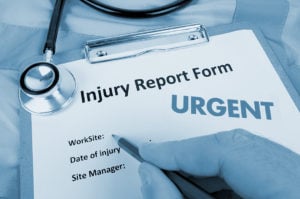How to Appeal a Workers’ Comp Denial
If you’ve been injured in a workplace accident and your workers’ comp claim has been denied, you still have options. If you disagree with the denial of your claim, you can appeal with the Utah Labor Commission. There are several reasons why you may be denied workers’ comp benefits, but if you decide to appeal, you will need to act quickly. There are statutes of limitations for filing and appealing your claim.
What is Workers’ Compensation?
Workers’ compensation insurance is required for nearly every business in the state of Utah. Workers’ comp protects injured workers by ensuring they are reimbursed for damages related to their workplace injury.
If your workers’ comp claim is approved, your employer’s insurance company will pay for bills related to your injury, such as hospital visits, physical therapy, medication, prosthetic devices, and other medical treatment expenses. It may also cover lost wages due to temporary or permanent disability. Finally, if an employee dies due to work-related injury or illness, workers’ compensation will pay up to a certain amount for funeral and burial expenses, as well as weekly dependent compensation to the surviving spouse/dependents.
What Types of Illness or Injury Are Covered?
Many industries require employees to perform physically taxing or dangerous jobs that can result in serious injury or illness. Some common workers’ compensation claim injuries include deep cuts and lacerations, sprains and strains, burns, broken bones, and eye injuries.
Workers’ comp can also cover cumulative trauma, such as joint damage from continuously performing a task over a long period of time. Employees who work in manual labor industries for many years may find themselves with injuries such as chronic back pain, tendonitis, and more.
Work-related illnesses typically include sickness due to exposure. Repeated exposure to coal dust or asbestos commonly leads to diseases, and may be covered by workers’ compensation. However, it can be hard to prove there is a link between your illness and the nature of your work. Illnesses like cancer and heart disease will require strong medical evidence to prove that they are work-related.
How Do I File for Workers’ Compensation Benefits?
In order to receive workers’ comp benefits, you should report your illness or injury to your employer immediately. If you fail to report within 180 days of the date of injury, you may be disqualified from receiving benefits. Once you have reported the injury to your employer, your employer has 7 days to report the claim to its insurance carrier, and the insurance carrier has 14 days to report to the Industrial Accidents Division.
After you have reported your injury, be sure to seek medical care. Provide your doctor with information regarding how, when, and where your injury occurred. Your doctor must complete a “Physician’s Initial Report of Injury or Illness” and submit the report to the Industrial Accidents Division within 7 days of your visit. Keep track of your medical records and treatment you receive.
Once the insurance provider has received reports from your employer and doctor, they will open a claim and determine within 21 days whether or not you will receive benefits, and how much compensation you will receive.
Why a Workers’ Compensation Claim May Be Denied
If your workers’ compensation claim is denied, you will be informed via a denial letter. Typically, this letter will outline why your claim has been denied. Some common reasons for denial of claims include:
- Failure to report injury prior to deadline: If you do not report your injury to your employer within 180 days, you will lose access to workers’ comp benefits. Additionally, if you wait a long time to report, it may cast doubt as to the cause of your injuries
- Employer dispute: Your employer may claim that your injury did not happen while on the job, or that it was due to horseplay or other inappropriate activity during work hours
- Failure to obtain medical treatment: In many cases, you must seek medical care in order to claim workers’ compensation
- Drug-related violation: You may be denied disability compensation if your injuries resulted from alcohol or drug abuse. Your claim may also be reduced if you failed to follow safety guidelines while working
- Pre-existing condition: Your injury or illness must be caused by a work-related accident. If the condition existed prior to your accident, your claim may be denied. You must prove that your work contributed to your injury in some substantial way
- Lack of evidence: If there is not strong enough proof that your illness or injury is related to work, you may be asked to provide more evidence, such as an additional medical evaluation, before your claim is approved
Your claim may be denied outright, or portions of the claim may be disputed.
How to Appeal a Workers’ Compensation Denial
If your claim is denied, it is best to first speak with the claims adjuster to find out the reason for the claim denial. You may be able to provide additional information that solves the problem.
If the insurance carrier continues to deny your claim, you have the right to appeal their decision with the Utah Labor Commission. To begin the appeals process, you must file an Application for Hearing with the Labor Commission’s Adjudication Division. After your appeal has been received, your employer will be required to file an Answer. When the Answer has been filed, a hearing will be scheduled in front of an administrative law judge. You will need to have evidence and arguments for your case. A workers’ compensation lawyer can help you compile the documentation you need.

After your hearing, the judge will send a written decision to both parties. If you are dissatisfied with the judge’s decision, you may file a Motion to Review within 30 days. The decision will then be reviewed by the Utah Court of Appeals.
How Can a Workers’ Compensation Attorney Help?
The Advocates are a team of experienced workers’ comp attorneys who can help you navigate the claims process. Workers’ compensation appeals can quickly become complex, and it helps to have a team of legal professionals on your side.
Most workers’ compensation claims will be settled through negotiations without ever going to trial. Fighting insurance companies on your own can be stressful and detrimental to your recovery. An attorney can help you negotiate with your employer’s workers’ comp insurance provider. Additionally, a workers’ comp lawyer can help you keep track of necessary documents, understand workers’ compensation laws, and protect your legal rights.
If you’ve been injured in a workplace accident, you need a competent, caring attorney on your side. Contact The Advocates today for a free consultation. You deserve fierce representation for your injury claim. You deserve an Advocate.